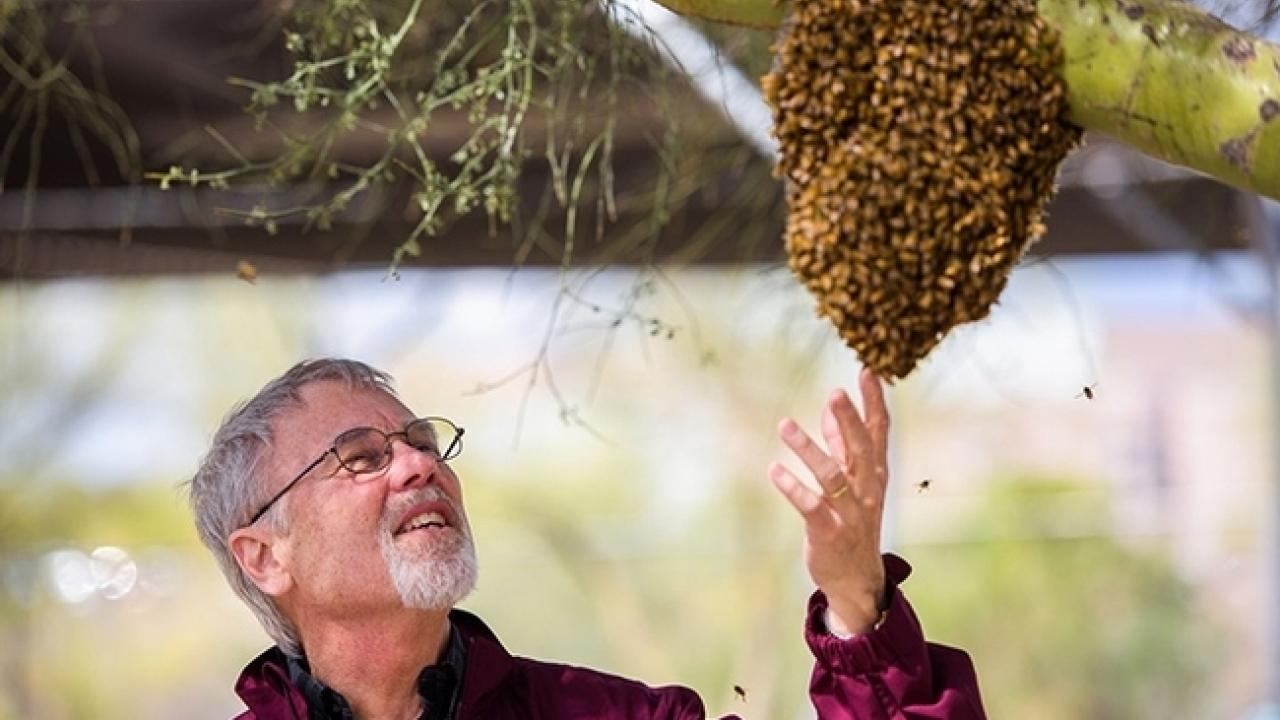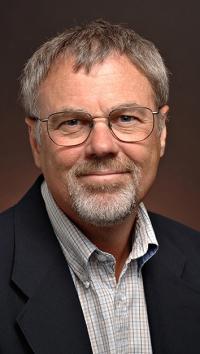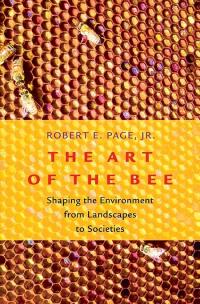
A Legend: Honey Bee Geneticist Robert E. Page Jr.
American Entomologist Features Rob Page in 'Legends'

"When an Africanized honey bee stung Robert E. Page, Jr., in the eye, the excruciating pain did not diminish his love for the insects. A pioneer in the field of honey bee social behavior and evolutionary genetics, Page’s passion for research has spanned forty-three years and continues today. He is considered a pioneer in the field and one of the current top bee scientists. A colleague stated that Page is 'arguably the most influential honey bee biologist of the past 30 years.'"
So began Marlin E. Rice in the American Entomologist's Legends feature, chronicling the life of internationally known honey bee geneticist Rob Page, a UC Davis doctoral alumnus, a UC Davis Distinguished Emeritus Professor, and Emeritus Chair of the UC Davis Department of Entomology who went on to build an exemplary scientific and administrative career at Arizona State University (ASU). Page holds the titles of ASU University Provost Emeritus and Regents Professor Emeritus.
Page is “a pioneer researcher in the field of behavioral genetics, an internationally recognized scholar, a highly respected author, a talented and innovative administrator, and a skilled teacher responsible for mentoring many of today's top bee scientists," as Steve Nadler, professor and former chair of the Department of Entomology and Nematologist wrote in a letter nominating him for the 2019 UC Davis Distinguished Emeritus Award. "Robert Page is arguably the most influential honey bee biologist of the past 30 years."
Page received his doctorate in entomology from UC Davis in 1980, where he studied with major professor Norman Gary and his doctoral research mentor, Harry H. Laidlaw Jr. He joined the UC Davis faculty in 1989 and chaired the Department of Entomology from 1999 to 2004, the year he gained emeritus status and the year ASU recruited him for what would result a series of top-level administrative roles.
Page is known for his research on honey bee behavior and population genetics, particularly the evolution of complex social behavior. One of his most salient contributions to science was to construct the first genomic map of the honey bee, which sparked a variety of pioneering contributions not only to insect biology but to genetics at large.
Page pioneered the use of modern techniques to study the genetic basis of social behavior evolution in honey bees and other social insects. He was the first to employ molecular markers to study polyandry and patterns of sperm use in honey bees. He provided the first quantitative demonstration of low genetic relatedness in a highly eusocial species.

Born and reared in Bakersfield, Kern County, Rob received his bachelor's degree in entomology, with a minor in chemistry, from San Jose State University in 1976. Following his doctorate from UC Davis in 1980, he served as assistant professor at The Ohio State University before joining the UC Davis entomology faculty in 1989. At UC Davis, Page worked closely with Laidlaw. Together they published many significant research papers and the landmark book, “Queen Rearing and Bee Breeding” (Wicwas Press, 1998), considered the most important resource book for honey bee genetics, breeding, and queen rearing.
For 24 years, from 1989 to 2015, Page maintained a UC Davis honey bee-breeding program, managed by bee breeder-geneticist Kim Fondrk. Their contributions include discovering a link between social behavior and maternal traits in bees. Their work was featured in a cover story in the journal Nature. In all, Nature featured his work on four covers from work mostly done at UC Davis.

Page is the author of The Spirit of the Hive: The Mechanisms of Social Evolution (Harvard University Press, 2013) and the Art of the Bee: Shaping the Environment from Landscapes to Societies (Oxford University Press, 2020). In 2023, he launched a YouTube Channel, https://youtube.com/@artofthebee.
Among Page's many honors:
- Fellow of the American Association for the Advancement of Science
- Awardee of the Alexander von Humboldt Senior Scientist Award (the Humboldt Prize - the highest honor given by the German government to foreign scientists)
- Fellow of the American Academy of Arts and Sciences
- Elected to the Leopoldina - the German National Academy of Sciences (the longest continuing academy in the world)
- Fellow of the Wissenschaftskolleg zu Berlin
- Fellow of the Entomological Society of America
- Fellow of the California Academy of Sciences
- Elected to the Brazilian Academy of Science
- Recipient of the James W. Creasman Award of Excellence from the Arizona State University Alumni Association
- Fellow, Carl Friedrich von Siemens Foundation, Munich, Germany, September 2017-August 2018
- Thomas and Nina Leigh Distinguished Alumni Award from UC Davis Department of Entomology and Nematology
- Distinguished Emeritus Professor, UC Davis
- Exceptional Faculty Emeriti Award, UC Davis College of Agricultural and Environmental Sciences

UC Davis emeritus professor Norm Gary, now 90, remembers Page as "enthusiastic and exceptional." In a June 17th email (to Kathy Keatley Garvey), he wrote: “When I first met Rob Page at the beginning of his graduate studies I was immediately impressed that he was a very exceptional student in all respects! He was enthusiastic about insect behavior, especially honey bee behavior. I became his major professor. His fascination with behavior soon evolved into behavioral genetics. Consequently, I encouraged him to conduct his graduate research under the direction of Harry Laidlaw whose research program focused on honey bee genetics."
" Rob and I shared several bee research projects, one of which involved research on honey bees to determine if insects would be adversely affected by exposure to microwaves from solar power satellites that were under consideration as a future source of energy for mankind. Rob excelled in all activities. His enthusiasm was contagious! He richly deserves the many rewards he has received during his career, especially for his superior skills in research, teaching, and leadership in every facet of the academic world.”
Norm Gary: Excellent Bee Behaviorist
In the Legends' piece, Page described Gary as "an excellent" bee behaviorist. "I got assigned to the bee lab with Norm Gary, an excellent bee behaviorist. I was out in the field one day and met Harry Laidlaw. He had just retired. I told him I was really interested in genetics and breeding, and how can I learn it. He gave me things to read. He showed me how to do artificial insemination. We did projects together. I did some breeding theory, and he was writing a new book on queen rearing and wanted to make recommendations about breeding, but he had no theory to back it, so I did the theory because I was interested in population genetics. Harry became a mentor whereas Norm Gary was my major professor."

Page also told Rice that he always knew he would go to college: "When I was born, my parents were living in a farm-labor camp in Lamont, California. My father had a sixth-grade education, and my mother was very demanding of me getting an education. My mother spent time teaching me to read, so I was reading fourth-grade readers when I was four years old. I don’t know that they necessarily knew I wanted to be a biologist, but there was never any question that I was going to college."
At age 19, Page enlisted in the military (during the Vietnam War) and was trained as combat medic. He never saw combat duty. He was stationed in Heidelberg at the U.S. Army Europe and Seventh Army headquarters. It was there that he met Michele, his wife-to-be. "We met in June and married in November," he told Rice.
Excerpts from American Entomologist:
Was your service in the military a positive or negative experience?
"The army training was fundamentally important to me being a university administrator. I learned leadership skills that I used every single step of the way. And I trained other faculty into leadership positions. The most important fundamental of what I learned of leadership in OCS is know what kind of leader you are and be consistent at it. There are different ways of doing it. You can push people. You can pull people. You can be a follow-me leader and lead from the front of the pack. You can be a shepherd, always re-routing them. Or you can steer them like a big ship. They are all equally good strategies. Different people use them in different ways. But you need to know what you are and be consistent."
Who was the most influential person in your education?
"Today, all my research approaches, the way I thought about things, everything I did I can point back to four people. Norm Gary taught me the importance of knowing behavior and having good behavioral assays. He was superb at it. Nobody knows better what bees will do than Norm Gary, but he doesn’t care much about why they do it. Which then brings me to my training in evolution from Tim Prout, who was an evolutionary biologist and population geneticist. He taught me population genetics, which I use to develop a population way of thinking about the work that I do. Harry Laidlaw taught me the value of breeding and the value of attention to detail. When we wrote papers together, we went over every word. Harry believed that every word had to be there for a reason. Every word had to be right. Robert A. Metcalf, an incredible guy, really turned me on to social insects, and got me interested in using molecular and biochemical markers. Everything I did for the rest of my career came from those four people."
I read your Societies to Genes paper, and you said the research focus was on just one trait: the amount of pollen stored in the nest, a social trait that is a consequence of the interactions of thousands of bees. Was this really your singular focus for thirty-five years?
"Yeah. That was it, and it took me a lot of different directions. I developed models on self-organization and emergent traits. It took me into genetics and molecular genetics. We went from the emergent trait, which is the amount of pollen stored in the comb, all the way down to sensory receptors and response systems, down to individual genes that we believe change frequency in the populations that we selected over time that are involved in making these foraging decisions. It’s been a single focus."
If a non-scientist asks what you do, how do you explain it?
"It’s always hard because I feel first and foremost that I’m an entomologist. I was trained in a very classical entomology background. And I’m a firm believer that if you’re going to be an entomologist, you really have to learn entomology. I did all of the physiology and anatomy and classification. I did it all, and I really became an entomologist. So first and foremost, I’m an entomologist, but I don’t work in the classical entomology areas. If they know I’m an entomologist, then they want to talk about bugs. I always find that a little bit awkward. I can’t tell you what chemicals are banned and what chemicals aren’t banned. I don’t do that anymore. If I start talking that I study bees, everybody loves bees, and they’ve got a story and want to talk about killer bees. And I have done some of that, but it’s hard for me to find a footing where I can say, 'What I do is study how the complex social behavioral system of honey bees evolved.' I dissect it into all the component parts associated with social behavior, and then I figure out how it works and how to put it back together again. They don’t want to go there. 'What about killer bees?' [they’ll say, or] 'I have some bees in my backyard and somewhere and every time we go out to eat on the deck, they are in our food.” [I’ll say] 'Well, those aren’t bees, they’re wasps.” [Then they’ll say,] 'They sure look like bees.” It’s always kind of hard."
What’s one book you would recommend that all graduate students read?
"The Voyage of the Beagle. I would buy The Voyage and The Origin of Species and give it to all my students."
(Editor's Note: Marlin Rice, a Fellow of the Entomological Society of America, has also featured UC Davis Distinguished Professors Bruce Hammock and Frank Zalom, now emeritus, in Legends.)
Resources:
- Standing Ovation for Honey Bee Geneticist Robert E. Page Jr., Nov. 14, 2022, Entomology and Nematology website
- Why Bees Are Artists and Engineers: Robert E. Page's New Book, July 30, 2020, Bug Squad blog
- Honey Bee Geneticist Rob Page Launches YouTube Channel: Fascinating World of Bees, May 4, 2023, Bug Squad blog
